Clive Ansley, David Kilgour and Peter Lamont* say the Chinese trials of the two Canadian ‘Michaels’ demonstrates once again that justice is simply an organ of the Chinese Community Party.
 The prison experiences of Canada’s ‘two Michaels’ during their more than 800 days in custody in China illustrates why the rule of law and independent judges and prosecutors are essential to good governance.
The prison experiences of Canada’s ‘two Michaels’ during their more than 800 days in custody in China illustrates why the rule of law and independent judges and prosecutors are essential to good governance.
Immediately after the Canadian authorities arrested Chief Financial Officer of Huawei, Meng Wanzhou in the wake of a United States Government extradition application in 2018, the ‘two Michaels’ — Kovrig ( pictured left) and Spavor (pictured right) — were detained in China for allegedly stealing State secrets.
While torture in China’s judicial system is described by leading human rights organisations as “routine, endemic and systemic”, it is unlikely torture has been applied to these two accused.
On the other hand, many who are familiar with conditions in Chinese prison and detention centres say incarceration is torture in and of itself.
A recent secret two-hour trial of Michael Spavor occurred suddenly in Dandong.
No foreign diplomats, including those of Canada, were allowed to enter the court. Precisely the same phenomenon has now occurred at the trial of Michael Kovrig in Beijing.
Why were the court hearings for the two men so brief?
The hearings only appear brief to some of us because we expected a typical Chinese ‘show trial’, televised and theatrical and going to great pains to disguise a Chinese court as one similar to those in countries with genuine judicial systems.
For reasons known only to its leaders, the Chinese Community Party (CCP) has eschewed the opportunity for theatre, but even bearing that in mind, these trials do not appear brief by Chinese standards.
Indeed, two hours could be deemed lengthy by CCP trial standards.
Complicated cases often require no more than half an hour of court time. The general rule is that Chinese judges try to finish before lunch.
A saying known to every Chinese litigation lawyer is: “Those who make the judgement have not heard the case; those who hear the case don’t make the judgement.”
Chinese courts at all levels include an internal and invisible Adjudication Committee, consisting of the Court President and several other judges.
The Adjudication Committee meets in secret and hears the recommendation of the presiding trial judge.
The prosecutor is often present, but nobody represents the accused.
The Adjudication Committee instructs the three trial judges who then reconvene the court and solemnly pronounce the committee’s decision as their own, whether they agree with that decision or not.
China’s Criminal Procedure Law explicitly requires all trials to be public, unless they involve “State secrets”, but in almost every instance, the trial is closed because supposed State secrets are involved.
Chinese judges are classified as Public Servants under Civil Service Law. A Chinese court is simply a low-level administrative organ of the CCP.
Canadian opinion appears firm about trends in China.
According to Nanos Research in early March, 61 per cent of Canadians support and 22 per cent somewhat support a Parliamentary motion declaring that China is committing genocide against the Muslim minority Uyghurs.
Fully 51 per cent favour and 19 somewhat favour seeking to relocate the 2022 Winter Olympics away from Beijing.
*Clive Ansley practiced law in China for 14 years. David Kilgour was Canadian Secretary of State (Asia-Pacific) in 2002 and 2003. Peter Lamont is a retired military judge who studied law in China.
This article first appeared on the website of the Hong Kong Free Press.



